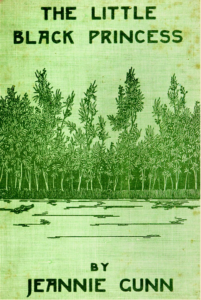by Jeannie Gunn (1870-1861)
 On Wednesday, Stacey Roberts discussed “Aboriginal domestic servants in colonial women’s fiction”, and mentioned the following “washing day” scene from Jeannie Gunn’s The Little Black Princess. Roberts’ discussion provides a context for reading Gunn’s work.
On Wednesday, Stacey Roberts discussed “Aboriginal domestic servants in colonial women’s fiction”, and mentioned the following “washing day” scene from Jeannie Gunn’s The Little Black Princess. Roberts’ discussion provides a context for reading Gunn’s work.
From Chapter 5: “Goodfellow Missus”
It was washing-day, and we were all delighted. So would you have been if you had been there; for when washing is done by black lubras the fun is always fast and furious.
Directly after breakfast, which was usually at sunrise, there was a wild scramble among the bundles of soiled clothes, followed by a go-as-you-please race to the billabong or water-hole. Each lubra, as she ran, looked like a big snowball with twinkling black legs; while perched on top of two or three of the snowballs sat little shiny-black piccaninnies. Bett-Bett had not had many washing-days, and that accounts for her being last with the stocking-bag. As they reached the creek every one dropped her bundle, slipped off her clothes and began the day’s work by taking a header into the water.
When I came along I threw big pieces of soap at them, and they all ducked and dived to dodge it, and when they came up they all ducked and dived again to find it.
“Now,” I said, sitting down in the shade of some pandanus palms, “come and begin, and wash the clothes very clean to-day.”
“You eye, Missus,” they all answered, as they scrambled out up the banks.
“And don’t play too much,” I added. At least, what I really did say was, “No more all day play-about.”
“You eye, Missus,” they all said again, but grinned at each other. They knew as well as I did that as long as the work was well done, I would let them play over it as much as they liked. You see, I was what white people would call a “bad mistress;” but the blacks called me a “goodfellow Missus,” and would do anything I wanted without a murmur.
They began to sort the clothes very seriously; but before half-a-minute had passed Bett-Bett and Judy were having a tug-of-war with a sheet, and everybody else was standing up to scream and shout. It was most exciting, particularly when Bett-Bett suddenly let go, and Judy and sheet took a double somersault into the water. As soon as her head came up every one pelted her with soap, which was the first thing that came handy. Then of course they all had to dive in to find it before they could go on with the washing. There is one thing a blackfellow can do perfectly, and that is to make hard work into play.
After all sorts of pranks, the clothes were sorted, and then every one climbed along an old tree trunk that had fallen into the water. There they sat, six naked lubras in a row, and rubbed and scrubbed and soaped, till the clothes looked like wet frothy balls, and the tree trunk was as slippery as an eel.
As they scrubbed, they kept up a perpetual sort of pillow fight with sloppy balls of clothes, knocking each other off the tree, till often there were more Lubras in the water than out of it. It certainly is a good plan to take your clothes off on washing-day in the tropics.
When everything was washed, the rinsing began; and if you like real fun, it’s a pity you were not there.
The sheets and big things were done first. After they had been carefully spread out on top of the water, every one climbed up the banks and took flying leaps into them. Down they went to the bottom wrapped up in a sheet or tablecloth, there to kick and splash till they came to the top again. The first person out of the tangle ducked the others as they came up, or else swam off up the creek with a sheet, which still had one lubra half rolled up in it, and two or three others hanging on to it.
And the babies? The little shiny-black piccaninnies? They just played and rolled over each other on the banks. Every now and then one would roll into the water, only to swim out again, or to dogpaddle after its mother.
And what were Sue and I doing all this time? We were sitting in the warm, pleasant shade, enjoying the washing circus, and wondering why everybody wasn’t drowned three or four times over. Blackfellows evidently can’t drown.
When the rinsing was finished, and the clothes were “cooking,” as we called boiling, the lubras put on their dresses and came and sat down near me. They knew well enough that I should have something good for them to eat. Canned fruit or sweet biscuit were always voted “goodfellow,” but there was nothing so good as treacle—“blackfellow sugarbag,” you know.
It was treacle to-day, and as every one lay laughing, smoking and resting, the tin was passed round and round. Very thin, bony, black fingers went in, and very fat, juicy black fingers came out, and were put into grinning, happy mouths, Sue getting a lick from Bett-Bett’s, every turn.
“Do you like washing-days, Bett-Bett?” I asked, as she sat waiting for another dig into the tucker.
“My word!” she grinned, dragging a crawling piccaninny from the treacle-tins by its legs.
~
Taken from Jeannie Gunn, The Black Princess: A True Tale of Life in the Never-Never Land, chapter 5, available from Project Gutenberg: https://www.gutenberg.org/cache/epub/57205/pg57205-images.html accessed 10/05/2023




